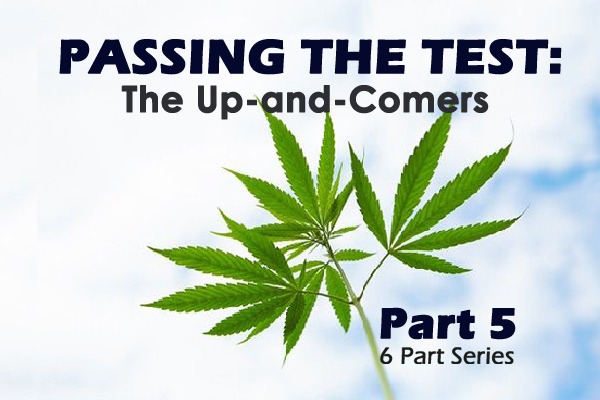BY MIKEL WEISSER
Rounding out the valley’s assorted testing options are two companies that are family affairs: KB Labs and Pure Labs Labs. In both cases learning about cannabis proved a turning point. For Boaz Lerer of KB Labs, the research meant looking into the newest canna-research out of his own home country of Israel. For Barbara Dow and Pure Labs, it meant looking into some of the oldest medical traditions on the planet in India.
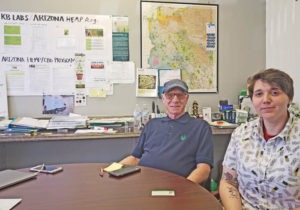
KB Labs
15855 N Greenway Hayden Loop #140, Scottsdale, AZ 85260, (602) 321-5695
https://kblabsaz.com/ageverify
BTW, KB is not just someone’s initials. Actually, it stands for KANNA-BOSM, an Old Testament anointing oil made from hemp. Originally from Israel and devotedly Jewish, KB Lab founder Boaz Lerer had studied the book of Exodus so much in grade school, he even has a scale model replica of the Hebrew Temple described in Exodus. “The priests in the temple used Kanna Bosm, or hemp oil on the ‘holiest of holies,’ they anointed the marble with the hemp oil. It made the marble seem alive. That is what made it holy. And that’s why I take this plant so seriously.”
Boaz Lerer founded this lab with his daughter, Talia, about two years ago. The choice was a longtime coming. Lerer, who studied science in college, immigrated from Israel 35yrs ago. Though Israel is the world leader in cannabis research, Lerer knew nothing of cannabis until after he moved to the US.
He worked as a chemist for Bristol-Meyers for decades and was doing diagnostic lab work on contract for the Mayo Clinic when Talia saw a news story about an e coli outbreak in lettuce and immediately thought of contaminated cannabis. “It was about five years ago,” Talia explained.
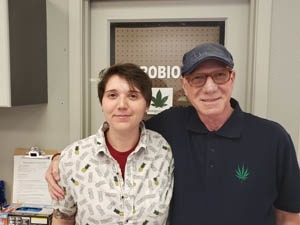
“You can’t go chasing sick people”
“I was having some trouble with getting paid for my work as a contracted scientist. I was competing with companies like Lab Core. Instead of the clinic paying me, I had to get paid by the insurance companies, who, you know, don’t like to pay for anything, so they would refer me directly to the patients for billing. You can’t go chasing sick people for pay like that, so I was in a bind and interested enough to look into it.”
“I knew very little about cannabis at the time,” Bo explained, but ever the scientist, he began to research. “It took about a year and a half of researching to decide to commit and then another year to start the transition.” When asked if she was a cannabis enthusiast at the time, Talia just giggles, grins and nods her head, “A little,” she laughs. She had been working in his labs all along and was thrilled to launch into a project in the cannabis space together.
The Idea of Mobility
At first, Lerer hoped to break away from the pack by offering mobile testing. KB liked the idea so much they made a microscope on wheels their logo and outfitted a humongous, customized Ford 350 Transit van with testing equipment and would drive his mobile lab to the customer’s place. Before long he discovered that his cannabis customers were a bit uncomfortable with the arrangement and wanted a “brick and mortar type facility,” so they moved the equipment back out of the van.
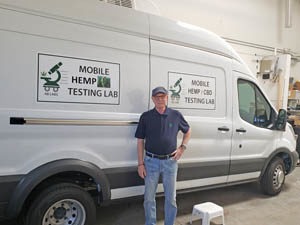
But the idea of mobility isn’t abandoned. With the advent of AZ’s brand-new hemp industry, Lerer is reconfiguring the van for mobile hemp potency testing. “The farmers like the mobile option instead of having to come to us. By fall we should be traveling all over the state servicing hemp farmers and still have our solid base here in Scottsdale.”
Bo’s banking the bulk of their labs work will be hemp related. Just so KB can be ready, Lerer’s certified to do Ag testing and even installed an electric generator in the van for remote site work and even outfitted a full-size Cummings diesel on a trailer to tow behind the van for really big jobs.
Like some of the other labs in the field, KB is already seeing a significant amount of hemp come through the door. The website refers to KB specifically as a hemp testing lab and boasts that it is “The Premier Hemp testing lab in Arizona.” To make sure their hemp testing program is the best it can be, it not only gets its own webpages, but Lerer has even built an entire separate lab with its own dedicated equipment specifically for hemp. “I think we’re the only lab in the state doing that,” he adds.
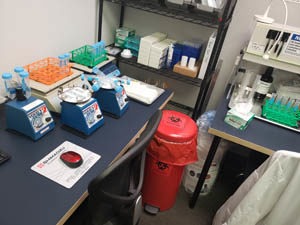
“The cannabis testing labs are the door keepers”
For Bo, coming from the diagnostic chemistry world, precision is key. “The cannabis testing labs are the door keepers, the tool for transparency. The health and safety testing is the most expensive part of the lab to outfit, but it’s the most important. We’re the ones who keep the bad actors out. Each lab is different. I am more focused on getting the science right. The volume will take care of itself. More quality, less emphasis on quantity.”
KB uses DA cards to legally possess the cannabis they’re testing and are associated with the Leaf Life Dispensary out of Casa Grande. They’re members of both NCIA and HIA and already completed the prep work for their ISO certification.
Bo’s quest for precision has also led him to hire top flight scientists and trade out all his original equipment for the latest state-of-the-art instruments from companies like industry leader, Agilent and Shimadzu. “These are 3rd generation machines, far more sensitive than the older ones.” Like other labs, Lerer was stunned by the cost of the equipment necessary to outfit a quality lab. “It cost more than $5000 for DNA profiles for the QPCR instrument.”
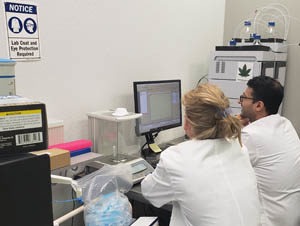
Avoiding California-Style Troubles
Thus far, virtually all KB’s customers have been industry growers, though they occasionally see a worried patient there to test their meds. “So far, we haven’t seen any serious problems with contamination in those cases. It seems mostly an issue of over-dosing, not contamination. You can’t overdose, per se, but people can take too much at one time. Larger doses are more erratic. It is much better to take a smaller dose and step it up 10mg at a time.”
Potency and terpene profiles make up the vast majority of KB’s tests. KB now tests for 40 cannabinoids, 21 terpenes and two pages of pesticides. When it comes to health and safety issues, they’re more likely to test for residual solvents than pesticides. They use petri-film for their microbial testing and do their mycotoxin tests in a separate room from the rest of the lab. “By far, the type of product most likely to be contaminated with microbes is a pre-roll,” Talia notes.
Since AZ’s testing regulations are not even in place yet, Lerer is using California cannabis testing standards in the meantime. The lab tests for 36 of the 66 pesticides regulated in California. “I like California’s regulation best. They’re sensible, but not as strict as Colorado or Oregon.”
Lerer looks to bottle necks like those faced by Oregon and California adult use programs as more the fault of the growers than the labs and believes with the capacity of the state’s seven testing facilities, AZ should be able to avoid the same kind of troubles.
“It’s important to get this message across. Cannabis cultivators need to start preparing now. When the deadline comes, any untested cannabis will be pulled from the shelves and destroyed. In California, MedMen lost twelve months’ worth of products because they weren’t ready. A growing cycle takes about five months and in a backlogged system it could take five months to get your products tested. If Arizona’s program begins November 1, 2020, growers have to start preparing now.”
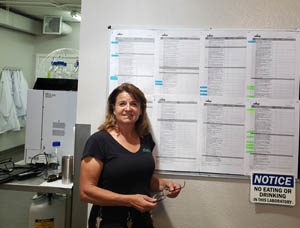
Pure Labs
4165 w Clarendon Ave, PHX 85019, 623-334-9194
(Website in Progress)
After nearly a decade working as a school administrator in India, and studying Ayurvedic medicine on her own time, when Barb Dow moved back to the states in 2007, she knew Arizona needed a more herbal path to healing. “I had studied so many approaches to healing and knew we needed to focus on other things beyond traditional western medicine,” she explained.
Dow had worked in numerous countries, including the Ivory Coast and South Korea, and been exposed to a wide variety of medical traditions. While in India, she saw both her father and her husband miraculously healed by local doctors using traditional healing methods and learned cannabis played a central role in the Ayurvedic medical tradition. In India, cannabis is considered a sacred traditional medicine and “ditch weed varieties grow everywhere.”
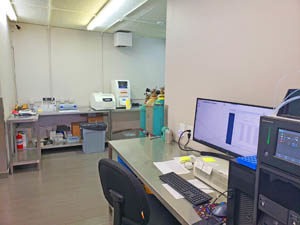
“Things Beyond Traditional Western Medicine”
Even after they returned to the states, Barb continued researching Indian medical approaches. “The research took the longest time. I am a very meticulous person and only make decisions after I have studied a problem from all angles.” Then 2009 she learned of a friend who was traveling to Mexico for medical marijuana treatments. When the state passed Prop203 and launched the medical marijuana program in 2010, Dow’s research went into high gear (pun intended.)
As part of her work at her property management service, she kept running into returning vets who were embracing cannabis to deal with their own symptoms, but she wondered how it actually worked and how the patients could be sure their medication was safe? When she learned that DHS didn’t even have a program for testing cannabis, Dow was inspired.
By 2017, Barb felt ensuring the safety of medical marijuana was her best way to get involved and get better medicine to AZ patients. At the time Dow and her husband, Scott, were operating a successful architectural metal fabrication shop in the industrial westside of PHX and hardly using the office space up front. Though neither of them are cannabis consumers, they latched onto the idea of launching a cannabis testing lab in the fall of 2017.
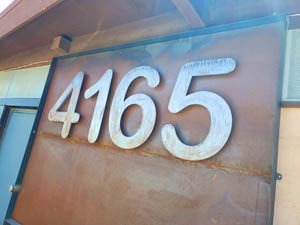
They started outfitting the lab by Oct. of 2018. By Feb of this year, they were fully open for business despite facing pushback from some surprising angles. Even though they enjoyed a solid reputation for their architectural metals company, banks would not touch their testing lab project and the architects they worked with refused to take on the necessary remodel to convert their empty office space into a functional lab. Barb laughs, “Even architects we knew turned down the project.”
Turns out the Dows didn’t need those architects after all. The finished, fully solar-powered, facility is itself an architectural metal wonder with both decorative steel and sheet metal plates covering the cinder block exterior. Featuring massive steel doors hung so precisely you can open and close them with one finger, latticed iron gates, and customized barbed rails protecting the top perimeter, this is easily the most secure cannabis testing facility in the state, if not several states.
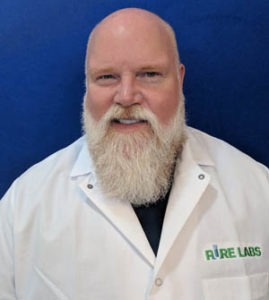
“The Opportunity to Innovate”
Next, Dow knew she would need a top-flight scientist to set-up her facility. After researching the Nevada market, Dow decided she wanted someone with a strong biological background. She conducted a months-long national search, which resulted in attracting their Chief Scientific Chemist, Kentucky native Dwain Irvan, from a top lab in St Louis.
Though he also personally does not imbibe, Irvan looks as bright-eyed and jolly as a hipster Santa … after his 3rd dab. A clinical laboratory experienced chemist with 34 years of lab experience, Irvan is CLIA (Clinical Lab Improvement Amendments) trained as an analytical bio-chemist.
“I really loved my work and feel like I was really good at that kind of science, but I am thrilled at the opportunity to innovate,” Dwain says, smiling from ear to ear. “The instrumentation is all the same, but now I have had a chance to build a lab from the ground up and set the direction myself.”
Like Irvan, the rest of Dow’s crew have never been cannabis enthusiasts themselves, but still feel like they’re living a dream come true. Lab techs Jenna Judd and Shayla Freeman were both high school chemistry teachers at the same Surprise area high school before transitioning in actual chemists.
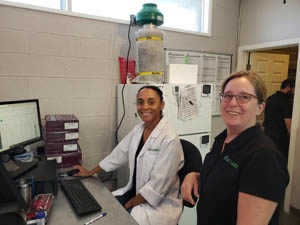
“Everything we’ve done since October is what I used to teach my students they’d grow up to do someday,” chemist Jenna Judd beams. “It is so exciting to actually be doing science instead of just teaching it.”
The experience has been a continuing education for chemists. So far, the company has participated in multiple national cannabis or chemistry conferences, including a food safety conference in Chicago, cannabis scientific conference in Portland and San Diego’s science focused Emerald Conference.
Due to Irvan’ clinical methods learned from 30+yrs of doing forensic science, Pure Labs protocols require rigorous validation for procedures and instruments, and they triple check lab results. Two cork boards are completely covered with flow charts of neatly typed and organized protocols.
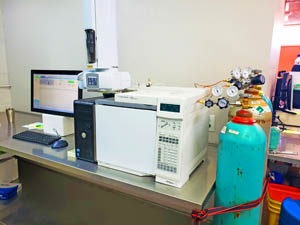
Aiming to be state-of-the-art, Pure Labs purchased all new testing instruments from a variety of manufacturers like Satorius, Nexera, Shimadzu, HTA, and Agilent. The clear majority of the tests they’ve run so far are flower potency and terpene tests, though the lab is fully equipped to test for residual solvents and microbial contamination. They use a separate room for their microbials and guard the entry with glue board-like floor-mats. Even their custodian is an RN. The lab also uses a 3rd party audit to double-check their paperwork.
Dow takes special pride in their speed of operations, “We test for 17 cannabinoids, 21 terpenes, water activity, moisture content residual solvents and 40+ different microbes with 24-hour turn-around time.”
For all Pure Lab customers Pure Labs even offers, prepaid FedEx shipping of samples to lab at no cost to clients.
Related
Part 1: The Long Road to Safety
Part 2: Basic Primer on Testing and Its Many Incomprehensible Terms
Part 3: The Pioneers (Desert Valley Testing & Delta Verde Labs)
Part 4: The Reformers (C4 Labs & Level One Labs)
Stay Tuned for Part Six, Patient Zero, How Jim Morrison’s Errl Cup Ignited the Patient Movement


